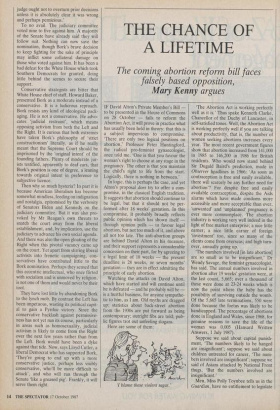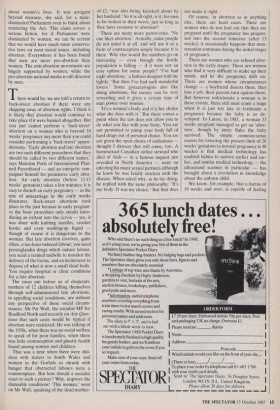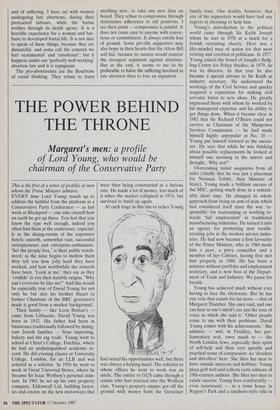THE CHANCE OF A LIFETIME
The coming abortion reform bill faces falsely based opposition,
Mary Kenny argues IF David Alton's Private Member's Bill — to be presented in the House of Commons on 28 October — fails to reform the Abortion Act, it will prove in practice what has usually been held in theory: that this is a subject impervious to compromise. 'There are only two logical positions on abortion,' Professor Peter Huntingford, the radical pro-feminist gynaecologist, once told me. 'One is that you favour the woman's right to choose at any stage in the pregnancy. The other is that you maintain the child's right to life from the start. Logically, there is nothing in between.'
In logic, this is perhaps the case, and yet Alton's proposal does try to offer a com- promise, in the classical English tradition. It suggests that abortion should continue to be legal, but that it should not be per- formed after 18 weeks' gestation. In this compromise, it probably broadly reflects public opinion which has shown itself — through opinion polls — to favour legal abortion, but not too much of it, and above all not too late. The anti-abortion groups are behind David Alton in his measure, and their support represents a considerable concession on their part, for by agreeing to a legal limit of 18 weeks — the present deadline is 28 weeks, or seven months' gestation — they are in effect admitting the principle of early abortion.
Watching the attacks on David Alton, which have started and will continue until he is defeated — and he probably will be — is a hurtful business, for anyone sympathe- tic to him, as I am. Old myths are dragged up; statistics about back-street abortion from the 1930s are put forward as being contemporary; outright fibs are told; pub- lic figures trot out unfeeling slogans.
Here are some of them: 1 blame these violent sagas.' `The Abortion Act is working perfectly well as it is.' Thus spake Kenneth Clarke, Chancellor of the Duchy of Lancaster, in self-satisfied tones. Well, the Abortion Act is working perfectly well if you are talking about productivity, that is, the number of women seeking abortions increases every year. The most recent government figures show that abortion increased from 141,000 in 1985 to 146,200 in 1986 for British residents. Who would now stand behind Sir Dugald Baird's prediction, made in Observer hpadlines in 1966: 'As soon as contraception is free and easily available, there will scarcely be any further need for abortion'? For despite free and easily available contraception, despite the Aids alarms which have made condoms more accessible and more acceptable than ever, `unwanted' and `unplanned' pregnancy is ever more commonplace. The abortion industry is working very well indeed in the light of free market enterprise; a nice little earner; a nice little earner of foreign 'investment' too, since so many of the clients come from overseas; and high turn- over, annually going up.
'The numbers involved [in late abortion] are so small as to be insignificant,' Dr Wendy Savage, the feminist gynaecologist, has said. The annual numbers involved in abortion after 19 weeks' gestation were, at the last count, 5,665; over a thousand of these were done at 23-24 weeks which is now the point where the baby has the possibility of surviving outside the womb. Of the 5,665 late terminations, 550 were done because the foetus was likely to be handicapped. The percentage of abortions done in England and Wales, since 1968, for genuine reasons to save the life of the woman was 0.005 (Hansard Written Answers, 1 July 1987).
Suppose we said about capital punish- ment, 'The numbers likely to be hanged are insignificant'; suppose we said about children untreated for cancer, 'The num- bers involved are insignificant'; suppose we said of Asians attacked by National Front thugs, 'But the numbers involved are insignificant.'
Men, Miss Polly Toynbee tells us in the Guardian, have no entitlement to legislate about women's lives. It was arrogant beyond measure, she said, for a male- dominated Parliament even to think about restricting the Act. This claim covers a serious fiction, for if Parliament were dominated by women, we can be certain that we would have much more conserva- tive laws on most moral issues, including abortion. Everywhere it has been found that men are more pro-abortion than women. The anti-abortion movements are hugely supported by women, while the pro-abortion national media is still directed by men.
There would be, we are told a return to back-street abortion if there were any chippin-g away of abortion rights. I think it is likely that abortion would continue to take place if it were banned altogether. But you just cannot perform a tack-street' abortion on a woman who is beyond 18 weeks' pregnancy any more than you could consider performing a 'back-street' appen- dectomy. 'Early abortion and late abortion are two such different procedures that they should be called by two different names,' says Malcolm Potts of International Plan- ned Parenthood — and an energetic cam- paigner himself for permissive early abor- tion. An early abortion (before 12-13 weeks' gestation) takes a few minutes; it is easy to disturb an early pregnancy — as the rate of miscarriage in the early weeks illustrates. Back-street abortions took place in the past because in early pregnan- cy the basic procedure only entails intro- ducing an irritant into the cervix — yes, it was done with knitting needles, crochet hooks and even washing-up liquid — though of course it is dangerous to the woman. But late abortion involves, quite often, a ten-hour induced labour; you need prostaglandin drugs which induce labour; you need a trained midwife to monitor the delivery of the foetus, and an incinerator to dispose of what is now a small dead body. You require hospital or clinic conditions for a late abortion.
The cases put before us of desperate mothers of 12 children killing themselves through self-administered late abortions, in appalling social conditions, are without any perspective of these social circum- stances. Mr Pat Wall, the socialist MP for Bradford North said recently on Any Ques- tions that such cases would be typical if abortion were restricted. He was talking of the 1930s, when there was no social welfare to speak of for poor families, when there was little contraception and ghastly health found among women and children.
That was a time when there were chil- dren with rickets in South Wales and women in the Gorbals so shrunk with hunger that obstructed labours were a commonplace. But how should a socialist react to such a picture? Why, improve the damnable conditions! 'This woman,' went on Mr Wall, speaking of the dead mother- of-12, 'was also being knocked about by her husband.' So it is all right, is it, for men to be violent to their wives, just so long as they have recourse to abortion?
There are many more parrot-cries. 'No one likes abortion.' Actually, some people do not mind it at all, and will use it as a form of contraception simply because it is there. Why else would the numbers go on increasing — even though the fertile population is falling — if it were not an easy option for some people? Tye had eight abortions,' a fashion designer told me lightly. 'But then I've had such wonderful lovers.' Some gynaecologists also like doing abortions; the money can be very rewarding and it gives a certain type of man power over women.
'It's a woman's body and it is her choice what she does with it.' But there comes a point when the law does not allow you to do what you like with your body. You are not permitted to pump your body full of hard drugs out of personal choice. You are not given the open choice of euthanasia — thought I daresay that will come, too. A homosexual Canadian airline steward who died of Aids — in a famous inquest just revealed in North America — went on infecting his many sexual partners although he knew he was fatally stricken with the disease. When asked why, as he lay dying, he replied with the same philosophy: 'It's my body. It was my choice.' But that does not make it right.
Of course, in abortion as in anything else, there are hard cases. There are women who do not find out that they are pregnant until the pregnancy has progres- sed into the second trimester (after 13 weeks); it occasionally happens that men- struation continues during the initial stages of pregnancy.
There are women who are refused abor- tion in the early stages. There are women who find it very difficult to make up their minds, and let the pregnancy drift on. There are women whose circumstances change — a boyfriend deserts them, they lose a job, their parents turn against them. But however unfortunate a woman is in these events, there still must come a stage when it is just too late to terminate a pregnancy because the baby is so de- veloped. In Luton, in 1983, a woman 33 weeks pregnant managed to get an 'abor- tion', though by sheer fluke the baby survived. The simple common-sense reason for lowering the present limit of 28 weeks' gestation (a normal pregnancy is 40 weeks) is that medical technology has enabled babies to survive earlier and ear- lier, and similar medical technology — the ultrasound scanner in particular — has brought about a revolution in knowledge about the unborn child.
We know, for example, that a foetus of 19 weeks and over, is capable of feeling and of suffering. I have sat with women undergoing late abortions, during their protracted labours, while the foetus writhes through its death agony. It is a horrible experience for a woman and bar- baric to developed foetal life. It is not nice to speak of these things, because they are distasteful, and some call the concern we feel 'sentimental' and 'emotional': but it happens under our 'perfectly well-working' abortion law and it is repugnant.
The pro-abortionists are the Bourbons of social thinking. They refuse to learn anything new, or take any new data on board. They refuse to compromise through doctrinaire adherence to old positions. I see their point — compromise is painful. It does not come easy to anyone with convic- tions or commitment. It always entails loss of ground. Some pro-life supporters may also hope in their hearts that the Alton Bill will fail, because its success would remove the strongest argument against abortion. But in the end, it seems to me to be preferable to halve the suffering involved in late abortion than to lose an argument.




























































 Previous page
Previous page